| Mercedes-Benz Citaro | |
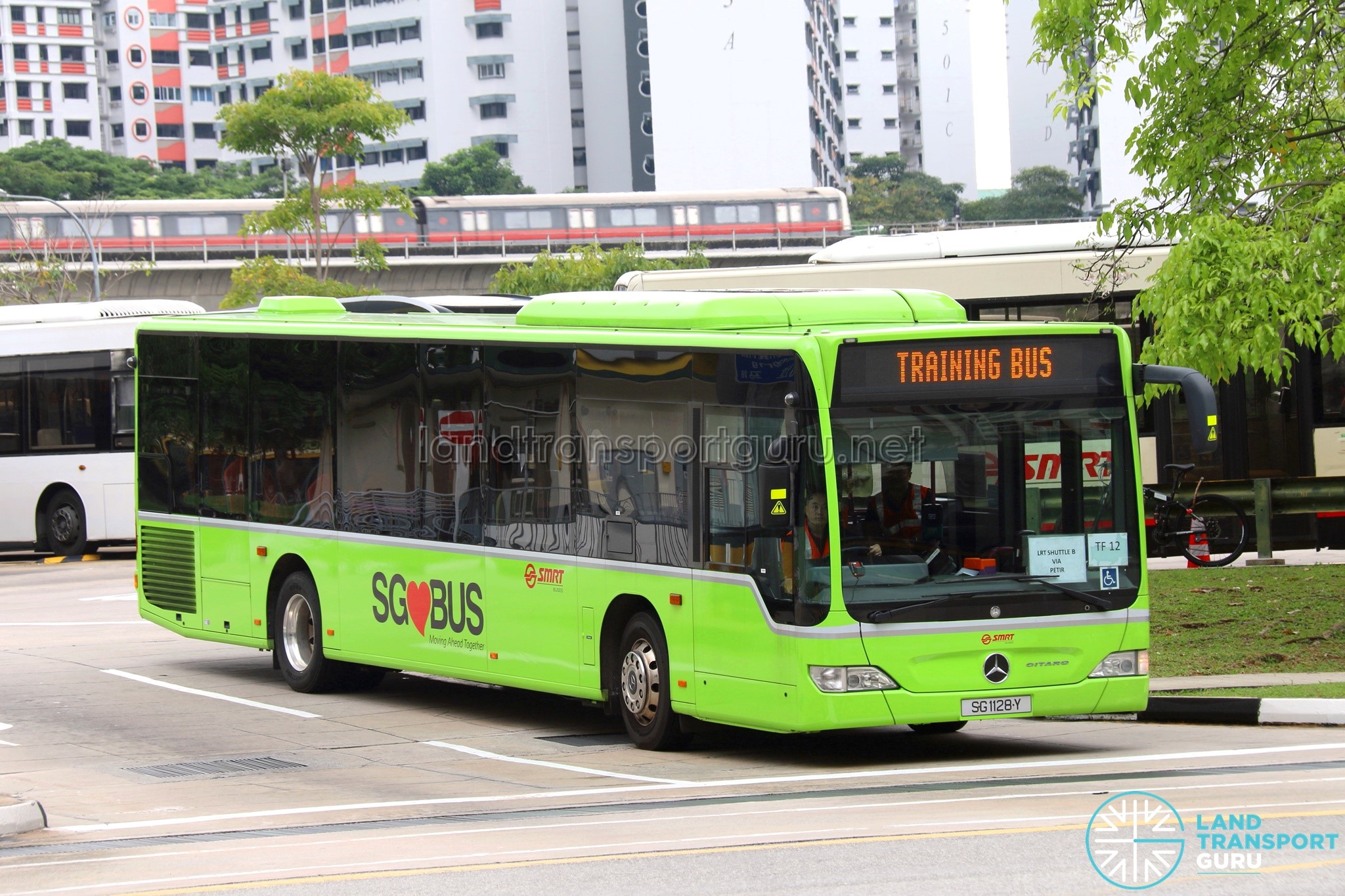 |
|
| Manufacturer | Daimler Buses GmbH (formerly EvoBus GmbH) |
| Years in operation | 2010—Present |
| Operators | SBS Transit SMRT Buses Tower Transit Go-Ahead |
| Quantity | 1,155 units |
| Technical Data | |
| Length | 12 metre |
| Engine | Mercedes-Benz OM906hLA |
| Transmission | ZF Ecomat 6HP 592C ZF EcoLife 6AP 1200B Voith DIWA D854.5 |
| Accessibility | Low Floor & Wheelchair-accessible |
| Emission Standard | Euro V (SCR) |
The Mercedes-Benz Citaro (designation O530) is a range of low-floor urban and suburban buses developed by Daimler Truck AG and its subsidiary Daimler Buses GmbH (formerly EvoBus GmbH). First introduced in 1997, the Citaro is one of the most successful city bus models worldwide, with over 70,000 units produced as of 2024.
In Singapore, the Mercedes-Benz Citaro is among the most widely deployed single-deck bus models, with a total of 1,155 units in service. These buses are operated by SBS Transit, SMRT Buses, Tower Transit, and Go-Ahead under the Bus Contracting Model (BCM), administered by the Land Transport Authority (LTA).
Between 2020 and 2021, a Mercedes-Benz Citaro Hybrid was trialled in Singapore, but no further orders materialised.
Citaro background
The Mercedes-Benz Citaro was first unveiled in 1997 at the UITP Congress in Stuttgart. It is available in both rigid and articulated versions, with lengths ranging from 10.5 to 21 metres. Except for specific low-entry variants, all Citaro buses are fully low-floor, enhancing passenger accessibility.
The model has evolved through multiple generations and emissions standards, from Euro II to Euro VI. Powertrain options have included diesel, compressed natural gas (CNG), and hybrid-electric variants, while the eCitaro, a battery-electric model, was launched in 2018.
All Citaro buses in Singapore are the Citaro C1 Facelift version (i.e. the 2006 facelifted first-generation Citaro), 12-metre urban bus configuration with two passenger doors. They comply with Euro V emission standards using BlueTec 5 selective catalytic reduction (SCR) technology, which requires the use of AdBlue diesel exhaust fluid.
Citaro buses are also built as integral units, with all elements of the bus fully assembled and fitted by Daimler. EvoBus manufactured Citaro buses built for the Singapore market in Mannheim, Germany.
Notably, Singapore continued to procure the first-generation Citaro even after the launch of the second-generation Citaro C2 in May 2011, likely for reasons of fleet standardisation and cost efficiency. Daimler maintained production of the Citaro C1 model until 2016, specifically to fulfil orders from the Singapore market.
Contents:
- SMRT Demonstrator Unit (SMB136C)
- SMRT Production Batch 1
- SBS Transit’s Citaros
- SBS Transit Production Batch
- SBS Transit BSEP Batch
Overview of Singapore Operations
SMRT Buses brought the first Citaro into Singapore as a demonstrator unit. A facelifted first-generation Citaro (Citaro C1 Facelift), it was registered as SMB136C, and entered service in March 2010, branded as “Southeast Asia’s 1st 100% Low Floor Euro V Bus”. The bus continued SMRT’s legacy with operator Mercedes-Benz buses, following its long history of operating O405s and O405Gs, and recently acquired OC500LE buses. Positive public feedback to the trial paved the way for more Citaros in Singapore.
By 2011, the exemption of the Additional Registration Fee (ARF) for public buses made importing the Citaro buses much more affordable. The first batch of 10 buses entered service in early 2011, followed by 40 additional buses later that year, for a total of 51 units.
Meanwhile, SBS Transit also opted to adopt the Mercedes-Benz Citaro, but in far larger numbers. Its first batch of 300 buses, ordered in 2010 during SMB136C’s trial period, began entering service in 2011. Further purchases include a second batch of 450 units ordered in 2012, and a third batch of 250 units ordered in 2014, bringing the total to 1,000 Citaro buses for SBS Transit alone.
In December 2015, the LTA bought out SBS Transit’s contract for any remaining Citaros yet to be delivered. Together with the Bus Service Enhancement Programme (BSEP) fleet, these buses have been gradually reassigned to other bus operators as part of BCM under a lease agreement. As a result, SMRT Buses, Tower Transit, and Go-Ahead Singapore now operate Mercedes-Benz Citaro buses built to SBS Transit specifications in their fleet.
SMRT Mercedes-Benz Citaro [Overview]:
SMRT brought in a single Demonstrator Unit and 50 Production Batch Mercedes-Benz Citaros (in two batches) between 2010 and 2011. These buses were built in Germany and shipped to Singapore completely-built-up.
Formerly allocated to all bus depots, their limited numbers within the SMRT fleet led to these buses being eventually consolidated into Ang Mo Kio Bus Depot. These buses were redeployed to Woodlands Depot in 2021, as SMRT’s Ang Mo Kio region operations were tendered out to Tower Transit under the Sembawang-Yishun Bus Package.
Many Citaro buses share similar technical specifications. Here’s a table at a glance:
| Demonstrator | Production Batch 1 | Production Batch 2 | |
| Quantity | 1 | 10 | 40 |
| Registration no. | SMB136C | SMB139U – SMB148T | SMB149R – SMB188C |
| Registered | Mar 2010 | Mar 2011 – May 2011 | Oct 2011 – Nov 2011 |
| — | Technical Specifications | ||
| Engine | Mercedes-Benz OM 906 hLA, turbocharged & inter-cooled, 6374cc Power/torque rating of 286 hp (210 kW) @ 2200 rpm / 1120 Nm @ 1200 – 1600 rpm |
||
| Emission Standard | Euro V compliant BlueTec Selective Catalytic Reduction (SCR) emissions control technology by Daimler AG, requiring diesel exhaust fluids such as AdBlue |
||
| Transmission | ZF Ecomat II 6HP 592C (6-speed) | ZF EcoLife 6 AP 1200 B (6-speed) Voith DIWA 854.5 (SMB148T only) |
Voith DIWA 854.5 (4-speed) |
| Electronic Display Signage (EDS) | Gorba imotion | LAWO BENEFIT | |
| Air conditioning | Konvekta P700 | Konvekta P800 | |
| Capacity | Seating: 37 | Standing: 51 | Total: 88 (With 1 Wheelchair bay) | ||
| Additional Features | Hopper windows Rear leaf doors Red fabric seat covers Mobileye 560 ADAS |
Hopper window (SMB145B) SMRT Passenger Information System (PIS) Side EDS with route details Mobileye 560 ADAS (SMB141L) |
SMRT Passenger Information System (PIS) Side EDS with route details Handlebars for wheel arch seats Third brake light (rear) Mobileye 560 ADAS (SMB187E) |
In addition, Citaros built to SMRT specifications all feature:
- Bode doors
- Entrance doors: Inwards swinging leaf doors
- SMB136C’s rear door: Inwards swinging leaf doors
- Production Batch rear door: Outward swinging plug doors
- City Star Eco (CSE) seats
- Independent wheel suspension system
Demonstrator Unit (SMB136C):
Detailed write-up: SMB136C: The Mercedes-Benz Citaro Demonstrator Unit
Following SMRT Buses’ first batch of wheelchair-accessible Mercedes-Benz OC500LE buses in 2008-2009, it saw the need to procure more wheelchair-accessible buses for fleet renewal and expansion. In Mercedes-Benz’s lineup, the Citaro was the direct successor to the O405 series of buses, which SMRT operated in large numbers (along with the articulated O405G variant). Boasting a full low-floor design, good ride comfort, fuel efficiency and Euro V-compliant emissions standards, SMRT decided to procure one unit for trial purposes.
Registered as SMB136C on 8 March 2010, the bus was unveiled on 9 March 2010 at a launch ceremony in SMRT’s Ang Mo Kio Bus Depot, exactly one day after its date of registration. Along with a promotional livery, it was marketed as “Southeast Asia’s 1st 100% low-floor Euro V bus”.
SMB136C entered revenue service a week later, appearing on Bus Service 855 on 16 March 2010. It was placed under a one-year trial on various trunk and feeder routes, and the trial was ultimately successful, with positive feedback from passengers spurring further purchases.
Technical Specifications:
The demonstrator unit SMB136C paired a standard Mercedes-Benz OM 906 hLA Euro V-compliant diesel engine with a six-speed ZF Ecomat II 6HP 592C transmission. This would also be the only Citaro in Singapore to feature the ZF Ecomat transmission unit, as future units would be paired with ZF Ecolife or Voith DIWA units instead. Furthermore, it was the first public bus in Singapore to feature electronic display signs (EDS) from Gorba.
SMB136C has a licensed carrying capacity of 88 passengers, comprising 37 seated and 51 standing passengers. The wheelchair bay accommodates a single wheelchair, and is equipped with a rear-facing foldable seat for two people when not occupied by a wheelchair user. Its interior layout would be duplicated in all future SMRT Citaro orders.
In Service:
SMB136C’s promotional livery was finally removed in late 2015, some five years after entering revenue service. The bus appeared on revenue service in full SMRT livery for the first time in December 2015. The SMRT logo was replaced with a full-red version shortly afterwards.
As of 2018, the bus is a designated Training Bus and permanently assigned to training duties. It is no longer assigned to revenue service.
Main Article: SMB136C: The Mercedes-Benz Citaro Demonstrator Unit
SMRT Production Batch: SMB139U – SMB188C
Following the successful trial of SMB136C, SMRT Buses purchased a total of 50 production batch Mercedes-Benz Citaro buses as part of its fleet renewal programme. This was spurred by LTA exempting public buses from the Additional Registration Fee (ARF), making importing the Citaros more affordable.
Buses were delivered and registered in two phases: an initial 10 units (SMB139U – SMB148T) between 11 March 2011 and 6 May 2011, followed by 40 more units (SMB149R – SMB188C) between 7 October 2011 and 30 November 2011.
On 21 March 2011, the initial batch of 9 buses made their debut on services 75, 531, 920 and RWS8 Staff.
Technical Specifications:
SMRT’s 50 production batch buses retain the standard Mercedes-Benz OM 906 hLA Euro V-compliant diesel engine, but contain two transmission options. The first 9 buses were fitted with a six-speed ZF EcoLife 6 AP 1200 B gearbox (SMB139U–SMB147X), while the remaining 41 received four-speed Voith DIWA 854.5 gearboxes (SMB148T–SMB188C).
These buses also use LAWO BENEFIT electronic display signs, with an enlarged nearside display to show route details in addition to just the bus service number. SMRT’s Passenger Information System (PIS), an LED text display, is integrated into the roof structure above the centre aisle and replaces the bus stopping indicator.
The air-conditioning unit was also upgraded to a Konvekta P800, replacing the Konvekta P700 on SMB136C and offering higher cooling capacity for Singapore’s tropical climate. Hopper windows, which were present on SMB136C, were swapped for regular windows. The rear doors, formerly inward-swinging leaf doors on SMB136C, were changed to out-swinging plug doors, with an additional visual indicator that lights up when the doors are closing.
Interior Specifications:
On the interior, the seat covers have also been changed to a blue and purple theme, with priority seats in red, similar to those used in the OC500LE. The PVC seat covers offer standardisation with other SMRT buses, and are also easier to maintain compared to SMB136C’s fabric seats.
For the later-delivered buses (SMB149R – SMB188C), additional grab poles were installed above the wheel arch and at the side of the front wheel arch seats for added passenger safety. These buses are also fitted with a third brake light at the rear.
SMRT Production Batch Citaros have a licensed carrying capacity of 88 passengers, comprising 37 seated passengers and 51 standing passengers. The wheelchair bay accommodates a single wheelchair and is equipped with a rear-facing foldable seat for two people when not occupied by a wheelchair user.
SMB148T: The SBS Transit Citaro Mock-Up
SMB148T was registered in May 2011 (while SMB139U – SMB147X were registered in March 2011). The bus was delivered with a Voith transmission, differing from the earlier 9 buses with ZF units. According to sources, the bus was retained by Mercedes-Benz’s local dealer, Jardine Cycle & Carriage (C&C), for two months, where it was fitted with a mock-up interior for SBS Transit. It was later reassembled with the SMRT interior configuration, registered and handed over to SMRT in May 2011, making its debut on Premium 531.
The interior fixtures are similar to those of its Batch 1 cousins, and its most distinguishing feature is the Mercedes-Benz badge at the front of the bus, which was not filled in black; this was later filled in later in its life.
Post-Delivery
For reasons unknown, SMB145B was refitted with hopper windows despite being delivered with full-pane windows.
As SMRT Buses’ New Livery was rolled out, SMB140P & SMB179D were the only units to receive the new pixel livery.
Refurbishment
In August 2021, several refurbished buses were deployed back on revenue service. They feature repainted interior panels as well as new floor covers.
SBS Transit Mercedes-Benz Citaro [Overview]:
In April 2011, while SMRT Buses was taking delivery of its first few Citaro buses, SBS Transit announced an order for 300 Mercedes-BenzCitaro buses. Costing $110 million, it was then the largest order of Citaro buses for the Asian market. Buses are denoted as ‘Batch 1’ and registered between April 2011 and August 2012.
In July 2012, SBS Transit announced a follow-up order for 450 more Citaro buses as part of its fleet renewal programme, identical to Batch 1 units barring minor interior details. An eventual 474 buses were procured under this batch order, with the additional 24 buses possibly added through the exercise of options. Buses in ‘Batch 2’ were registered from January 2013 to April 2015.
In July 2014, a third order for 250 Citaro buses was placed. Deliveries started in April 2015 and were slated for completion by 2016; but midway through deliveries, the LTA bought out SBS Transit’s contract for any remaining Citaros yet to be delivered, and increased the order for 80 more buses as part of fleet expansion. A total of 330 buses were thus procured, with deliveries extended through to 2017.
SBS Transit’s Mercedes-Benz Citaro orders are made complicated by their parallel registration under two separate registration number sequences: one for SBS Transit-owned units, and another for Government-owned units under the Bus Service Enhancement Programme (BSEP) and later the Bus Contracting Model (BCM). A breakdown of orders is as follows:
| Production Batch | Purchased under BSEP or BCM | Year of Registration / Total Units | |
| Batch 1 | SBS6000L – SBS6285G with gaps in registration numbers (258 units) |
BSEP buses: SBS6300X – SBS6341C (42 units) |
2011–2012 (300 units total) |
| Batch 2 | SBS6600E – SBS6865H (269 units) |
BSEP buses: SBS6342A – SBS6549X (229 units) |
2013–2015 (474 units total) |
| Batch 3 | SBS6866E – SBS6893B (28 units) |
BSEP buses: SBS6546D – SBS6599B, SBS2000M – SBS2004C (55 units) BCM buses: SG1000G – SG1071B, SG1080A – SG1245S, SG1691L – SG1699R (247 units) |
2015–2017 (330 units total) |
BSEP-registered buses (326 units):
Back in 2012, when the Bus Service Enhancement Programme (BSEP) was launched, some newly-delivered Mercedes-Benz Citaro buses were transferred over to Government ownership, as funded by the BSEP budget. These buses were registered using the SBS63xx registration numbers, from SBS6300X to SBS6599B in numerical order. The last 5 units were registered SBS2000M–SBS2004C as the SBS66xx registration numbers had already been used up by Batch 2 Citaros.
A total of 326 buses were registered between 2012 and 2015.
BCM-registered buses (247 units):
In 2015, the Bus Contracting Model (BCM) was launched. To support the gradual implementation, Citaro buses were procured by tapping into SBS Transit’s existing orders, and along with BSEP-registered Citaros, these government-owned buses would thereafter be leased out to successful tenders of the various route packages. In line with standardising all future buses under the SG-registration prefix, buses were registered from SG1000G onwards in numerical order. Breaking with this sequence is a small batch of 9 buses registered SG1691L–SG1699R, which were initially repainted to SMRT colours.
A total of 247 buses were registered between 2016 and 2017.
Many Citaro buses share similar technical specifications. Here’s a table at a glance:
| Production Batch 1 | Production Batch 2 | Production Batch 3 | |
| Quantity | 300 | 474 | 330 |
| Registration no. | SBS6000L – SBS6285G (with gaps in registration numbers) SBS6300X – SBS6341C |
SBS6600E – SBS6865H SBS6342A – SBS6549X |
SBS6866E – SBS6893B SBS6550R – SBS6599B SBS2000M – SBS2004C SG1000G – SG1071B SG1080A – SG1245S SG1691L – SG1699R |
| Registered | Apr 2011 – Dec 2012 | Jan 2013 – Apr 2015 | Apr 2015 – Dec 2017 |
| — | Technical Specifications | ||
| Engine | Mercedes-Benz OM 906 hLA, turbocharged & inter-cooled, 6374cc Power/torque rating of 210 kW (286 hp) @ 2200 rpm / 1120 Nm @ 1200 – 1600 rpm |
||
| Emission Standard | Euro V compliant BlueTec Selective Catalytic Reduction (SCR) emissions control technology by Daimler AG, requiring diesel exhaust fluids such as AdBlue |
||
| Transmission | Voith DIWA 854.5 (4-speed) | ||
| Electronic Display Signage (EDS) | LAWO HIGHLED | ||
| Air conditioning | Konvekta P800 | ||
| Capacity | Seating: 35 | Standing: 55 | Total: 90 (With 1 Wheelchair bay) | ||
| Additional Features | — | — | — |
In addition, Citaro buses built to SBS Transit specification all feature:
- Bode doors
- Entrance doors: Inwards swinging leaf doors
- Rear exit doors: Outward swinging plug doors
- City Star Eco (CSE) seats
- Independent wheel suspension system
SBS Transit Procurement Details – By Batch
SBS Transit – Batch 1 (SBS6000L–SBS6285G; SBS6300X–SBS6341C)
In April 2011, while SMRT Buses was taking delivery of its first few Citaro buses, SBS Transit announced an order for 300 facelifted 1st-generation 12-metre Citaros to replace its retiring Volvo B10M-61 (Mark III) buses. Costing $110 million, it was then the largest order of Citaro buses for the Asian market to date. Buses are denoted as ‘Batch 1’ and registered between April 2011 and August 2012.
Among the 300 buses procured, 258 units, namely SBS6000L – SBS6285G (with unused registration numbers in between), were registered to SBS Transit. Midway through deliveries and registration, 42 units of this batch were reallocated to the then-newly-launched Bus Service Enhancement Programme (BSEP), for deployment on new BSEP routes, as well as the service enhancement of existing routes. BSEP Buses were registered as SBS6300X – SBS6341C. All buses were registered between 26 April 2011 and 3 December 2012.
The large order of Citaros was made possible with LTA’s exemption of public transit buses from the Additional Registration Fee (ARF), enabling SBS Transit to acquire the Citaros at a much lower price and in bulk. A handover ceremony was organised on 16 May 2011 at SBS Transit’s Ang Mo Kio Depot with the first two SBS-registered Citaros, SBS6000L and SBS6001J. SBS6000L entered revenue service on 1 June 2011 on Service 28 between Tampines and Toa Payoh.
Technical Specifications:
Technical specifications of the new batch are very similar to those in SMRT’s production batch, with the only differences being interior configuration and the high-density LAWO HIGHLED electronic display signage.
SBS Transit’s Citaro buses retain the standard Mercedes-Benz OM 906 hLA Euro V-compliant diesel engine, paired with a four-speed Voith DIWA 854.5 transmission. This would be standardised across its Citaro procurements.
Additional Specifications:
On the outside, the most distinguishing feature is the LAWO Electronic Destination Signage (EDS), which appears more defined than SMRT’s Citaro EDSes. The LAWO HIGHLED used in SBS Transit Citaros is a much denser array of LEDs to display clearer text, and they are able to form images such as those used in Express and Fast-Forward routes. The swinging-plug exit door is the same as those on SMRT’s production batch.
The seating configuration slightly differs from SMRT’s Production Batch of Citaros, with the exclusion of two seats and the foldable seat at the wheelchair bay, allowing for a larger standee area. The foldable seat is replaced with a simple backrest. Seats use PVC covers in SBS Transit’s colour scheme; yellow seats between the front and rear doors, and red seats for the rear half of the bus. A manual wheelchair ramp is fitted at the rear door as a standard specification.
The first few buses in this batch were equipped with a larger palm-type bus stopping bell pushes, but subsequent buses had reverted to the normal push-button-type bus stopping bell. The larger bus stopping bell could be easily triggered by leaning on it, causing frequent false indications to the driver, and these were eventually replaced with normal push-button-type bells.
From SBS6150L onwards, larger and more air-conditioning vents were installed to cope with the tropical climate.
Finally, the bus stopping sign has been integrated into the design, similar to SMB136C, but instead just shows the word “STOPPING”.
SBS Transit Batch 1 Citaros have a licensed carrying capacity of 90 passengers, comprising 35 seating passengers and 55 standing passengers. The wheelchair bay accommodates a single wheelchair.
SBS6103Z is fitted with a next stop reporting system (with audio) and electronic screens as part of an LTA-initiated trial. The bus is not on revenue service. More on this bus at this news article.
SBS Transit Batch 2:
Following the success of the first batch of Citaros, SBS Transit decided to follow up with a second batch of Citaros as part of its fleet renewal programme. In July 2012, an order for 450 Mercedes-Benz Citaros and another 550 Volvo B9TL Wrights was announced, at S$433 million. Of the 1,000 new buses, 260 were funded by the Government under the Bus Services Enhancement Programme (BSEP), while SBS Transit will fund the 740 buses under its growth and fleet replacement plans.
24 Additional Citaros were delivered as part of this batch on top of SBS Transit’s initial announced order, for a total of 474 buses under Batch 2.
266 units were registered to SBS Transit, namely SBS6600E – SBS6865H. The remaining 208 units were allocated to the Bus Service Enhancement Programme (BSEP), registered as SBS6342A – SBS6549X, for deployment on new BSEP routes, as well as the service enhancement of existing routes. All buses were registered between 2013 and 2015.
Additional Specifications:
Buses in this batch have minor additional features compared to the Batch 1, such as extra CCTVs and an extra grab pole at the front of the bus, beside the driver’s cab. They were registered from SBS6600E to SBS6865H.
SBS Transit Batch 2 Citaros have a licensed carrying capacity of 90 passengers, comprising 35 seating passengers and 55 standing passengers. The wheelchair bay accommodates a single wheelchair.
SBS Transit Batch 3:
In July 2014, SBS Transit announced orders worth S$311 million for 250 Mercedes-Benz Citaro buses and 415 Volvo B9TL Wright buses, a total of which 296 will be funded by the Government under the Bus Service Enhancement Programme (BSEP). These 250 Mercedes-Benz Citaros fall under Batch 3, with deliveries starting in April 2015.
However, in December 2015, the LTA bought out SBS Transit’s contract for any remaining buses yet to be delivered, transferring these buses to the Bus Contracting Model (BCM).
The Batch 3 Mercedes-Benz Citaro buses were registered from 23 Apr 2015, using the registration numbers SBS6866E – SBS6893B for SBS Transit-owned buses, SBS6550R – SBS6599B, SBS2000M – SBS2004C for BSEP buses and SG1000G – SG1071B, SG1080A – SG1245S, SG1691L – SG1699R for BCM buses.
80 Additional buses were ordered by LTA on top of SBS Transit’s order of 250 buses.
Additional Specifications:
They feature:
- Same flooring design for raised parts of the bus and the floor of the bus.
(The first 23 batch 3 buses, batch 2 & 1 buses had a grey floor design on the raised part of the bus at the seating area after the exit door) - Leg safety panel directly after exit door and standee area changed from frosted glass to black glass.
- Reduced height of exit door sensor
As announced in December 2015, LTA bought over 12 Citaros from SBS Transit to expand the BCM bus pool. These buses are SBS6882H to SBS6893B.
SBS Transit Batch 3 Citaros have a licensed carrying capacity of 90 passengers, comprising 35 seating passengers and 55 standing passengers. The wheelchair bay accommodates a single wheelchair.
SBS Transit BSEP Batch
For background information on the BSEP, read the Bus Service Enhancement Programme article.
Before the Bus Contracting Model (BCM) was launched, the LTA had directly funded the purchase of buses under the Bus Service Enhancement Programme (BSEP) launched in 2012, where these resources were used to launch new bus routes and enhance existing ones. Whilst registrations for Batch 1, 2 and 3 Mercedes-Benz Citaro were ongoing, a portion of buses from each batch were diverted to the BSEP, where they were registered as SBS6300X – SBS6599B and SBS2000M – SBS2004C.
Technical specifications of the BSEP-registered Citaros are identical to the Production batches from which they were taken.
- Initial batch: SBS6300X – SBS6341C
= Similar to Batch 1 specs - Second batch: SBS6342A – SBS6549X
= Similar to Batch 2 specs - Third batch: SBS6550R – SBS6599B, SBS2000M – SBS2004C
= Similar to Batch 3 specs
Deliveries ended in early 2016 with the remainder of buses registered under the BCM instead. BSEP Mercedes-Benz Citaros were also the first buses to spearhead the transition to the BCM as these buses were owned by the Government.
Additional Specifications:
Under the BSEP, these buses are subject to strict deployment regulations, such as being barred from commercial advertising, and deployment only on BSEP bus routes or enhanced bus routes under the BSEP scheme. The LTA can track bus positioning, passenger loading statistics and other parameters in real time.
Transition to Bus Contracting Model (BCM)
For a more detailed guide, please refer to this article.
As part of the BCM, LTA would purchase buses from both SBS Transit and SMRT Buses to lease them to the winning transport operators of the various route packages. The bus models for this scheme include SBS Transit’s Mercedes-Benz Citaros, SBS Transit’s Volvo B9TL Wrights, SMRT’s MAN A22s, SMRT’s Alexander Dennis Enviro500s as well as SMRT’s MAN A95s.
LTA has initiated the BCM initially using buses destined for SBS Transit but registered under the Bus Service Enhancement Programme (BSEP). These buses, destined for service with SBS Transit fleet but owned by LTA, were rerouted to operators of the first few BCM packages such as Tower Transit, the initial operator of the Bulim Bus Package. As such, several new Citaro buses built to SBS Transit (Third Batch) specifications would be registered from SG1000G onwards.
To further expand the BCM bus pool, the LTA said on 29 December 2015 that it would take over SBS Transit’s bus purchasing contracts worth S$164 million for 346 new bus purchases, scheduled for delivery in 2016 and 2017. It will also directly buy 50 buses, worth about S$23 million, which were delivered to SBST between June and December in 2015.
Among the 346 buses to be procured under the contracts, 100 are single-deck Citaro buses, and among the 50 buses to be bought from SBS Transit, 12 are single-deck Citaro buses. These 12 buses from SBS Transit were SBS6882H – SBS6893B.
SBS Transit Specification Citaros for SMRT
On 11 Feb 2016, 9 Mercedes-Benz Citaro buses were registered as SG1691L – SG1699R for SMRT Buses. These buses were originally to be registered SG1011A – SG1019D for Tower Transit under the Bulim Bus Package. However, for various reasons, they were passed on to be operated by SMRT Buses for the short term, possibly to offset smaller quantities of MAN A22 buses ordered under the BSEP. With insufficient MAN A22 BSEP buses, new BSEP bus services such as Service 805 were introduced running on non-BSEP buses.
Main Article: New Mercedes-Benz O530 Citaro for SMRT Buses
Some of these buses in the SMRT Pixel Livery were later returned to LTA Bus Storage in June 2022. In September 2023, SG1695B was transferred to SBS Transit from SMRT Buses.
SG1000G – 1000th Mercedes Benz Citaro Celebrations
To celebrate the delivery of the 1000th Citaro, SG1000G had a large “1000th Citaro Celebrations” text pasted across the windows, on both sides of the bus. First spotted in early March 2016, the bus was also programmed with a custom “1000th Citaro Bus In Singapore” Electronic Display Signage message used for Daimer’s opening of a regional center for Commercial Vehicles in South East Asia in Singapore.
When SG1001D was the first Citaro to be registered under the BCM, as compared to SG5000E being the first Volvo B9TL, we gather that SG1000G was likely reserved by the LTA for the 1000th Citaro delivered to Singapore.
The bus is currently operated by SBS Transit, sporting an early version of the Lush Green livery with a grey section at the front. The operator logo was added in early 2017.
Cross Border Operations
In 2022, several SBS Transit Mercedes-Benz Citaro buses were registered with Malaysia for cross-border operations, replacing the previous fleet of Scania K230UB (Euro IV) buses.
These are:
- SG1020Z – SG1022T, SG1028C – SG1033L, SG1035G – SG1040R, SG1042K – SG1050L, SG1103T, SG1104R, SG1117D – SG1119Z, SG1121R – SG1123K, SG1128Y – SG1130P, SG1134D, SG1135B, SG1137X, SG1142E, SG1198U – SG1201T, SG1209Y – SG1224C
- SG1225A (added in 2026)
See also: New Bus Fleet for Cross-Border Public Buses – Land Transport Guru
| Mercedes-Benz O530 Citaro (SMRT Buses order) |
||||||
| Batch | Registration | Engine | Gearbox | Introduced | Retired | Notes |
| D | SMB136C | Mercedes-Benz OM906hLA | ZF 6HP592C | 2009 | – | Demonstrator Unit Gorba Imotion |
| P1 | SMB139U – SMB147X | ZF EcoLife 6AP 1200B | 2011 | – | Production Batch / LAWO BENEFIT |
|
| SMB148T | Voith DIWA D854.5 | |||||
| P2 | SMB149R – SMB188C | 2011 | – | |||
| Mercedes-Benz O530 Citaro (SBS Transit order) |
||||||
| 1 | SBS6000L – SBS6285G | Mercedes-Benz OM906hLA | Voith DIWA D854.5 | 2011-2012 | – | LAWO HIGHLED |
| 2 | SBS6600E – SBS6865H | 2013-2015 | – | LAWO HIGHLED | ||
| 3 | SBS6866E – SBS6893B | 2015 | – | LAWO HIGHLED | ||
| B1 | SBS6300X – SBS6341C | 2012 | – | BSEP Batch / LAWO HIGHLED |
||
| B2 | SBS6342A – SBS6549X | 2013-2015 | – | |||
| B3 | SBS6550R – SBS6599B, SBS2000M – SBS2004C | 2015 | – | |||
| Mercedes-Benz O530 Citaro (Registered under Bus Contracting Model) |
||||||
| BCM | SG1000G – SG1071B, SG1080A – SG1245S, SG1691L – SG1699R |
Mercedes-Benz OM906hLA | Voith DIWA D854.5 | 2015 – 2017 | – | BCM Batch / LAWO HIGHLED |
Summary of SBS Transit Batch deliveries:
Batch 1
- Original order of 300 units
- Later split into Batch 1 (285 units) and BSEP Batch 1 (42 units)
- BSEP buses are funded by the BSEP scheme
Batch 2
- Original order of 450 units
- Later split into Batch 2 (263 units) and BSEP Batch 2 (187 units)
- BSEP buses are funded by the BSEP scheme
- Additional 24 buses delivered (3 units to Batch 2, 21 units to BSEP Batch 2)
Batch 3
- Order of 250 units, to be split between Batch 3, BSEP Batch 3 and BCM batch
- Split into 31 Batch 3, 76 BSEP Batch 3 and 143 BCM Batch.
- BSEP buses are funded by the BSEP scheme and may be used also under BCM.
- BCM batch buses funded by the Government and leased to operators of BCM route packages.
- 80 more buses ordered by LTA for BCM Batch.
Major Accidents & Incidents:
| Registration | Service | Incident Date | Description | Location | Link |
| SBS6145C | TBC | 26 Oct 2016 | Hit by prime mover. Bus subsequently de-registered and scrapped. | Clementi Rd, outside Kent Ridge Bus Terminal | [1] |
| SBS6403H / SBS6329P | 945 |
11 Jul 2021 | SBS6403H was hit by SBS6329P and flipped on its side. A total of 17 people were injured. SBS6403H subsequently laid up and scrapped on 18 Aug 2023 (see: Tower Transit Bus Collision at Bukit Batok Bus Interchange) | Bukit Batok Bus Interchange | [1] |
| SBS6132P | 27 | 22 Sep 2021 | Collided with Skytrain viaduct pillar at Changi Airport. Driver & two passengers injured. Bus subsequently de-registered in Jun 2022 and scrapped. | T3 Basement Drive | [1] |
| SBS6093T | 53 | 25 Dec 2021 | Collided with tree. Bus subsequently de-registered & scrapped in Feb 2023. | TPE (slip road to KPE) | [1] |
| SG1226Y | Employee Bus | 9 Oct 2022 | Fatal accident with tree; no passengers onboard. Bus subsequently scrapped in Feb 2024. | Defu Avenue 1 | [1] |
| SBS6406A |
TBC | 10 Apr 2023 | Fatal accident with cyclist; bus impounded | Pasir Ris Drive 3 x Pasir Ris Central junction | [1] |
| SBS6042R | 137 |
21 Nov 2024 | Fatal accident – bus lost control and collided with a tree. Driver subsequently died in hospital & 5 passengers were sent to hospital. |
Kaki Bukit Avenue 2 x Kaki Bukit Road 2 junction | [1] |
Gallery (Interior):
Gallery (Refubished Interior):
Gallery:
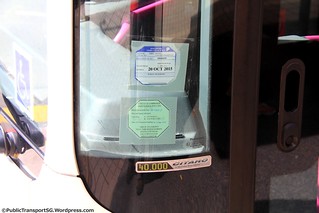 40,000th Citaro sticker on SBS6818U |
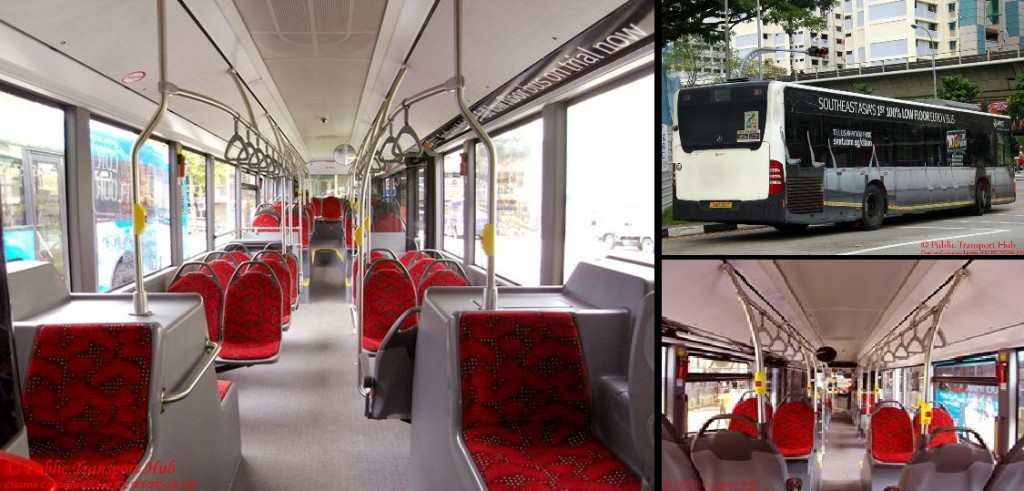
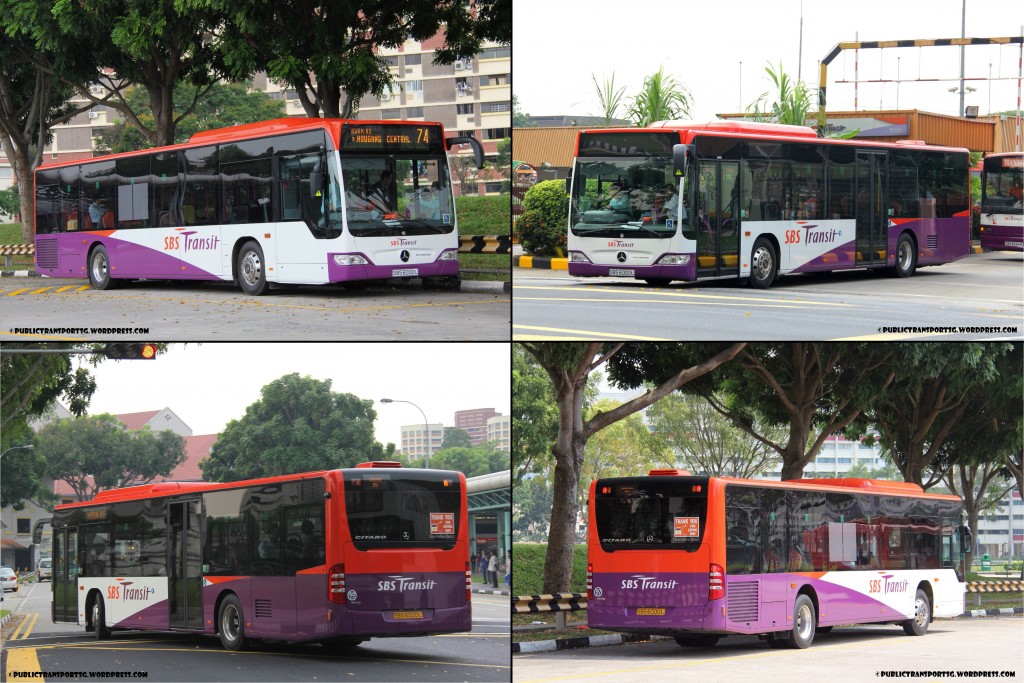
See Also:
- BYD K9
- Go-Ahead Singapore trials BYD Electric Bus
- Volvo 7900 Hybrid
- Volvo Diesel Hybrid Buses procured by LTA
External Links & References:
- Mercedes-Benz Citaro for South-East Asia: SMRT to test the Citaro in Singapore for the local market – Daimler [Accessed 16/04/20]
- The Citaro city buses – Mercedes Benz [PDF] [Accessed 14/01/18]
- Mercedes-Benz Citaro G BlueTec Hybrid – Mercedes-Benz [Accessed 14/01/18]
- The future has arrived: World premiere of the Mercedes-Benz Citaro FuelCELL-Hybrid bus – Mercedes-Benz [Accessed 14/01/18]
- Bus charging ahead. Countdown for the Mercedes-Benz Citaro E-Cell – Mercedes-Benz [Accessed 14/01/18]
- Daimler opens new regional center for Commercial Vehicles in South East Asia – Mercedes-Benz [Accessed 14/01/18]
Back to Bus Models
Back to Bus Articles
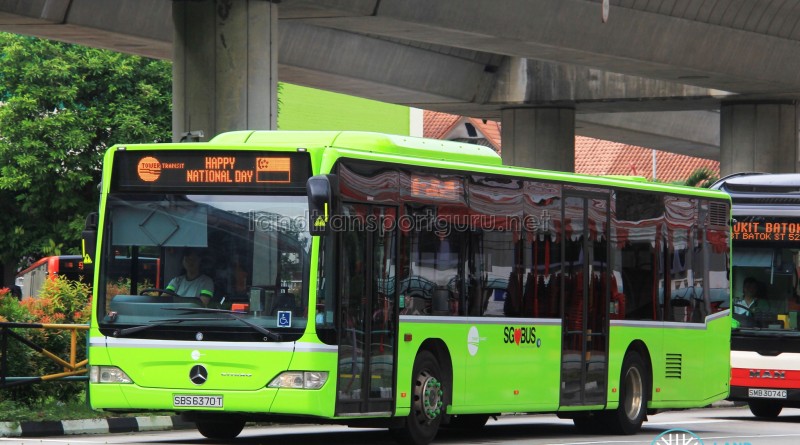
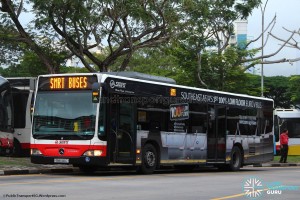
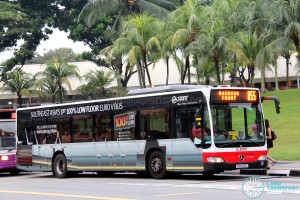
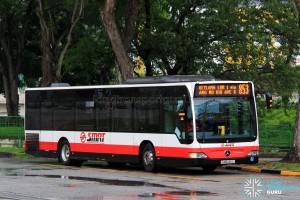
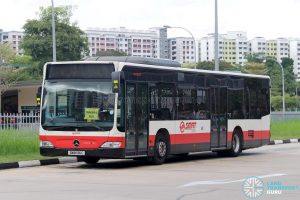
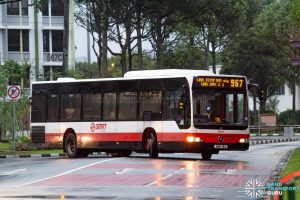
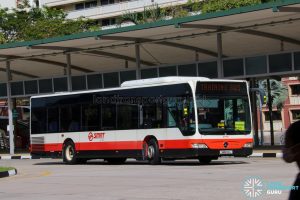
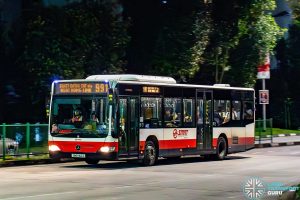
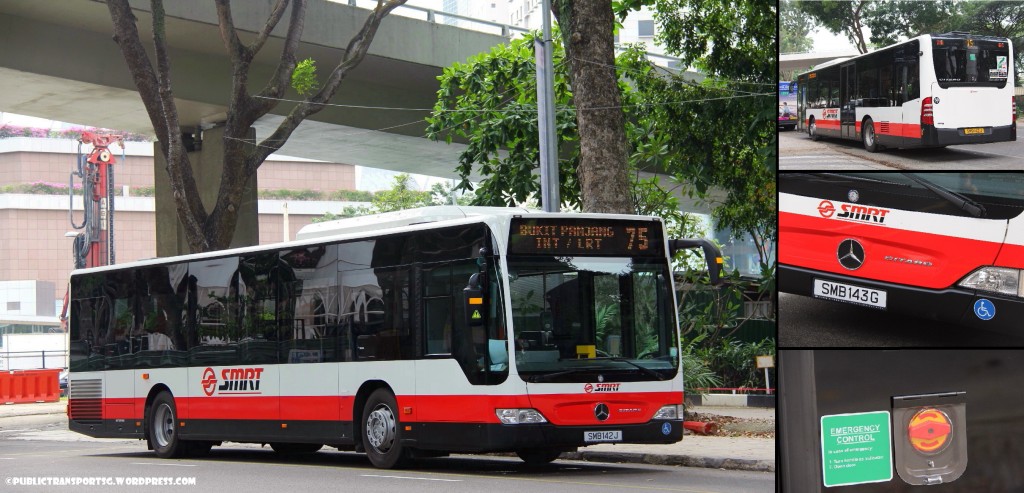
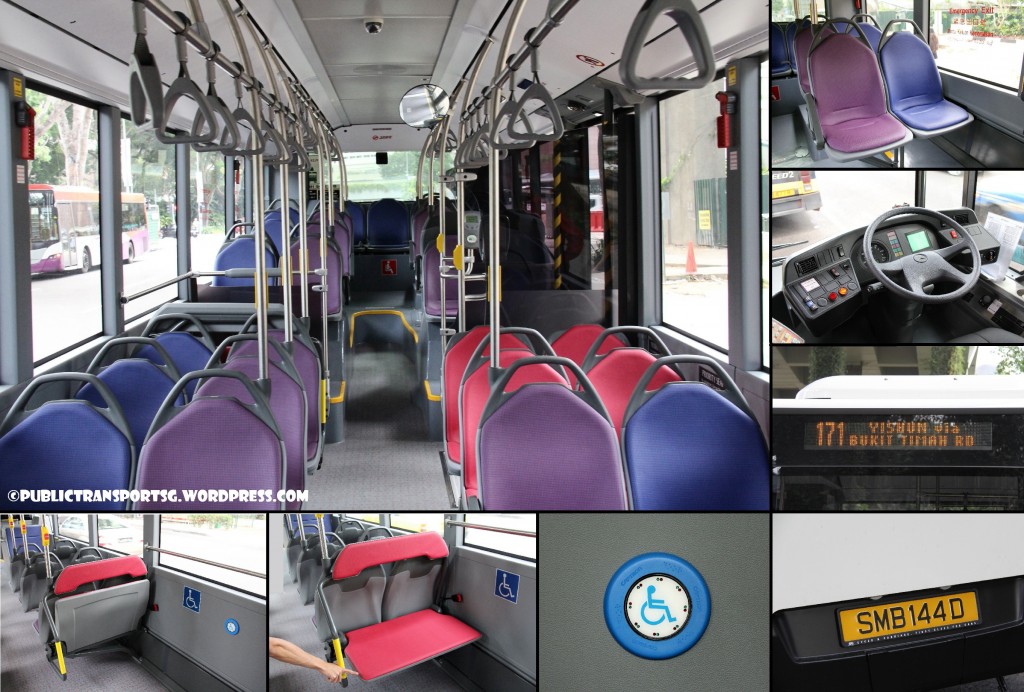

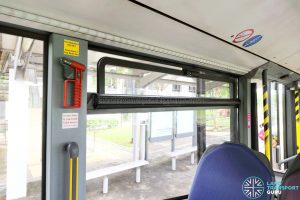
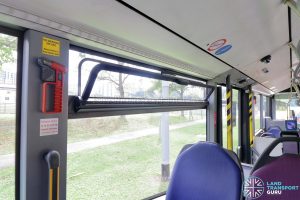
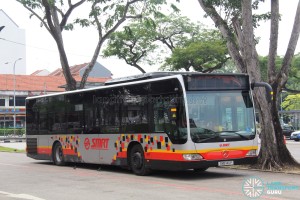
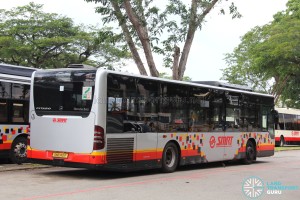
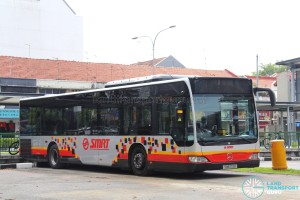
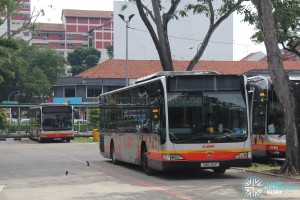
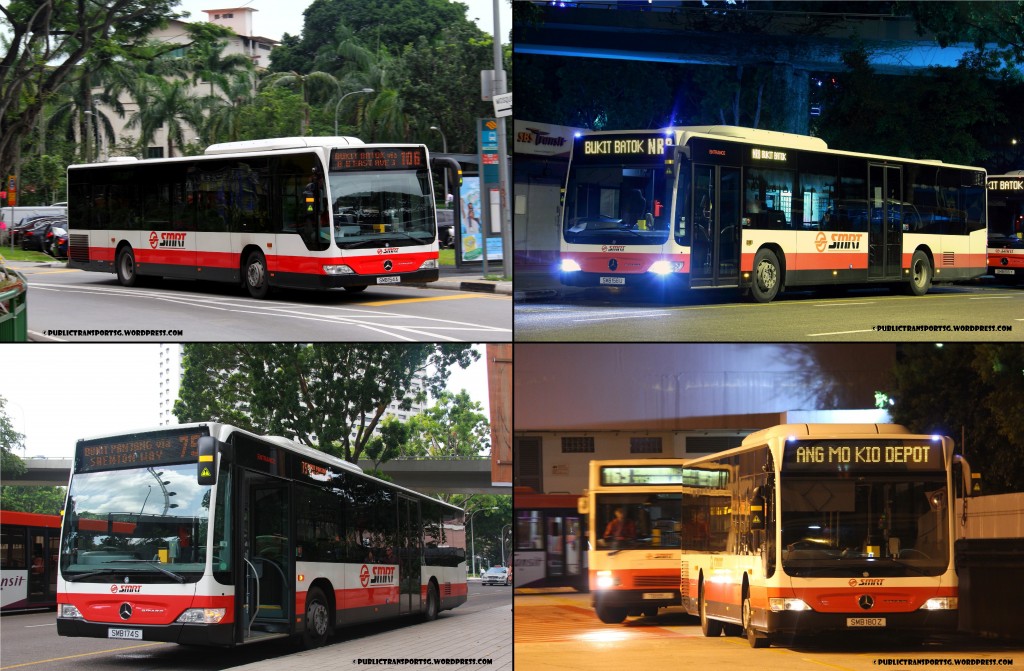
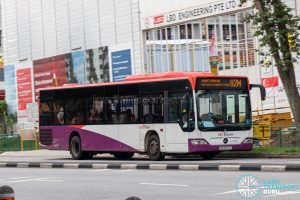
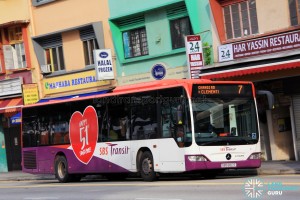
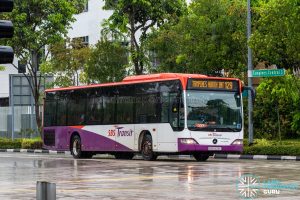

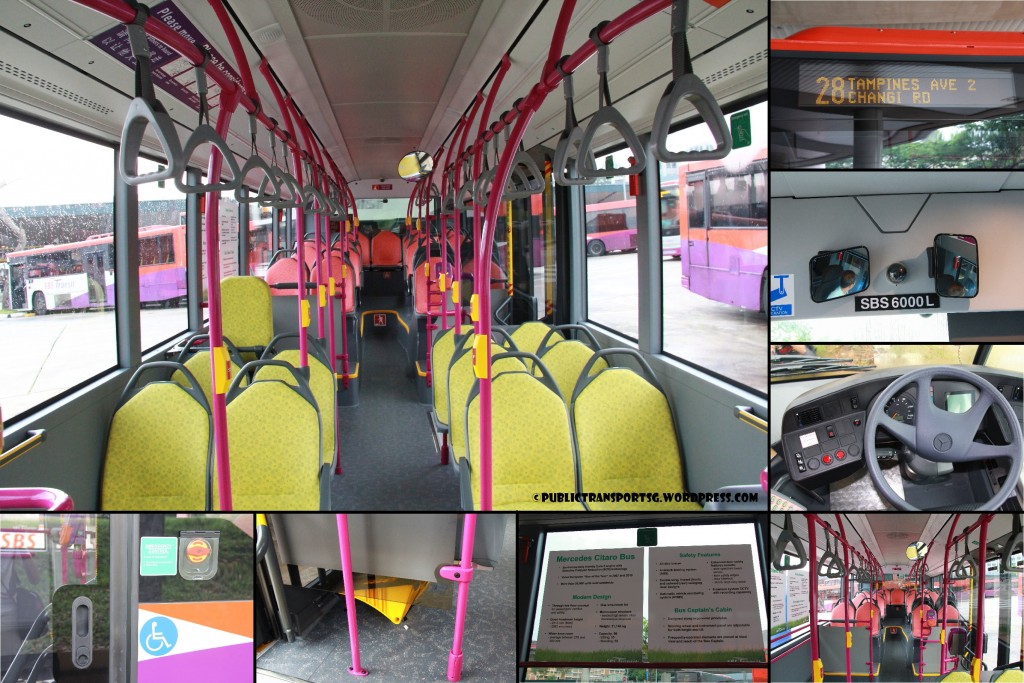
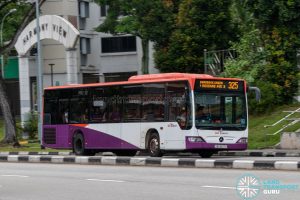

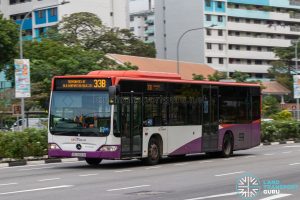
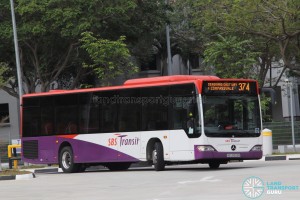

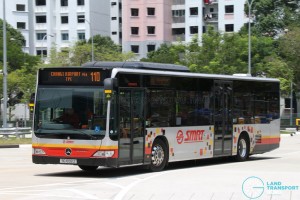
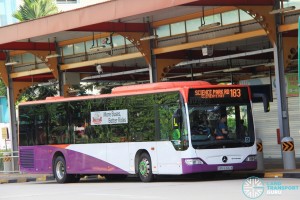
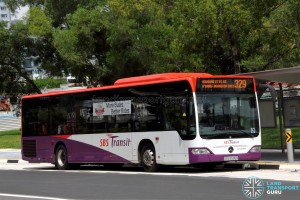
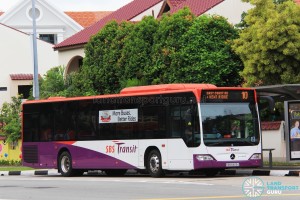
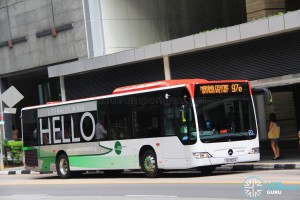
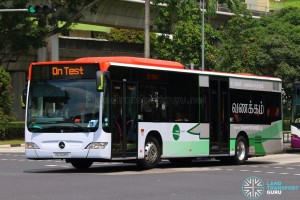
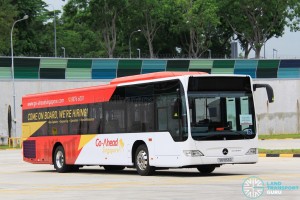
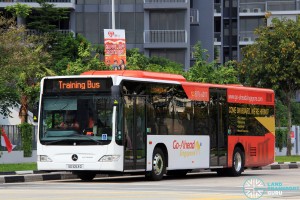
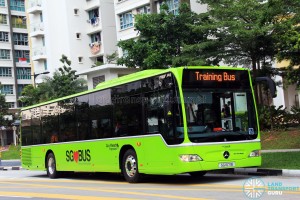
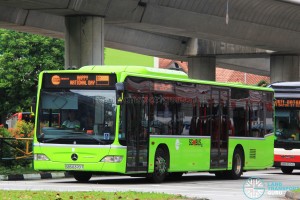
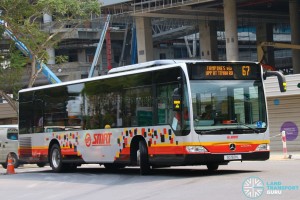
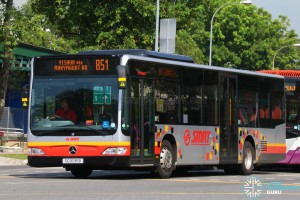
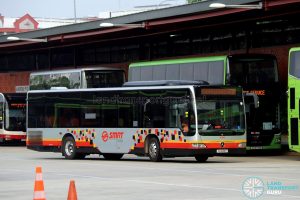
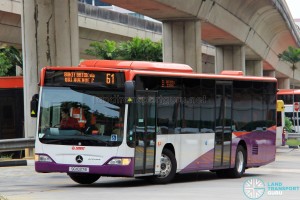
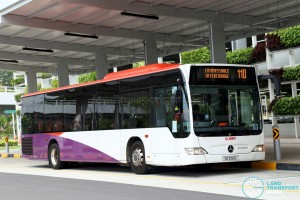
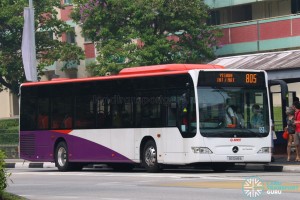
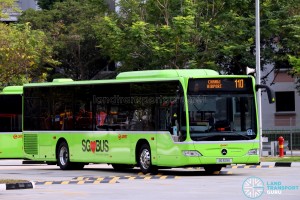
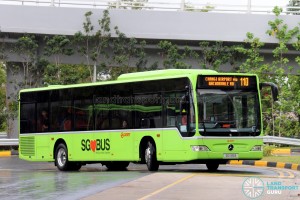
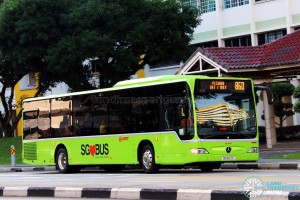
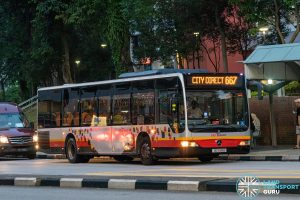
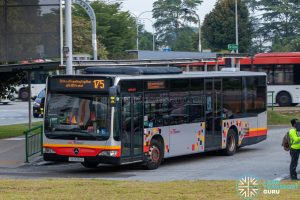
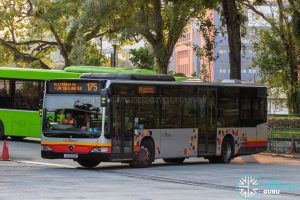
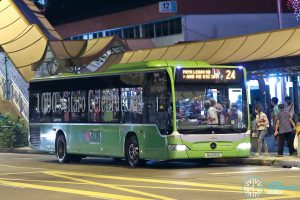
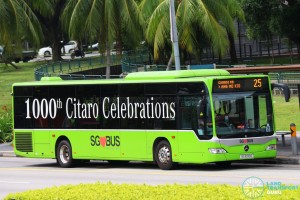
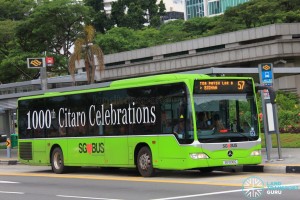
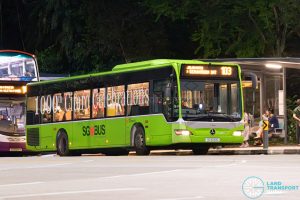
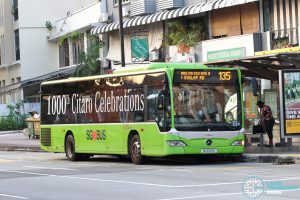
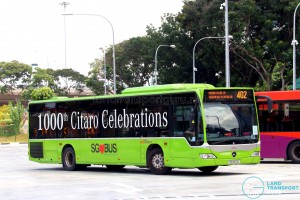
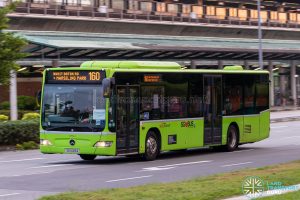
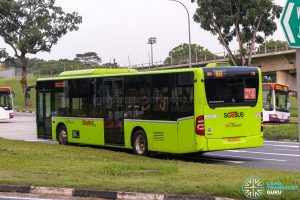
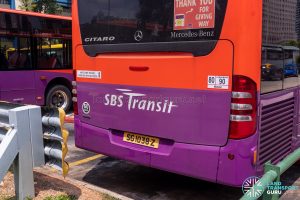
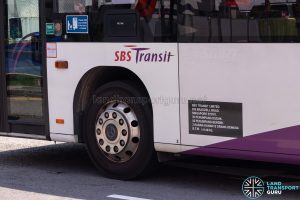
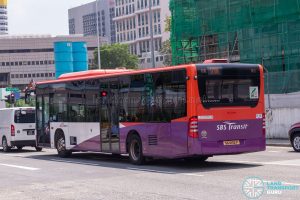
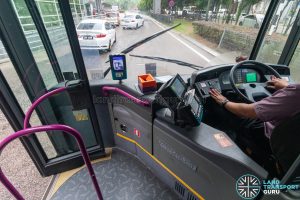
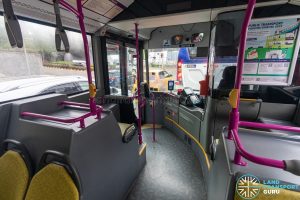
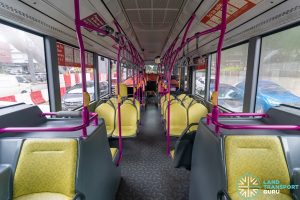
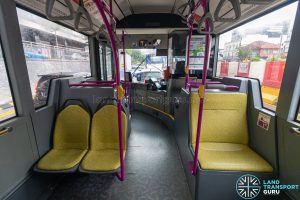
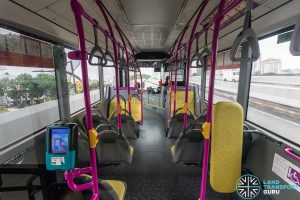
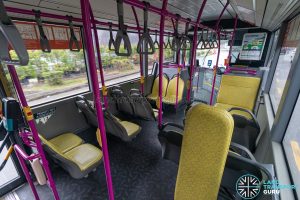
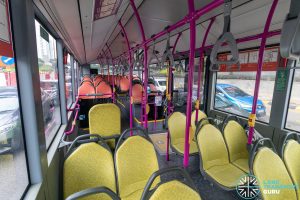
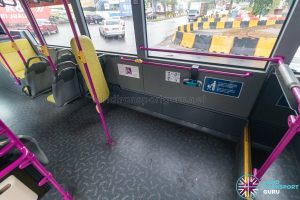
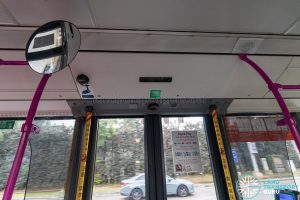
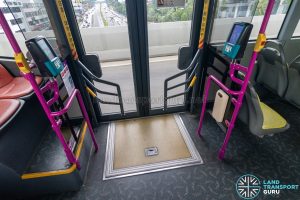
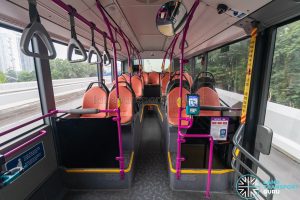
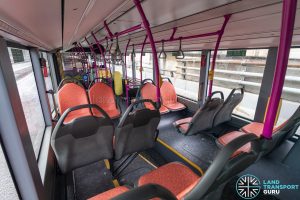
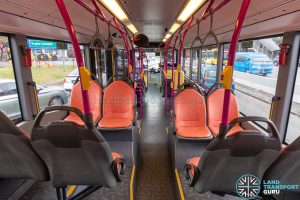
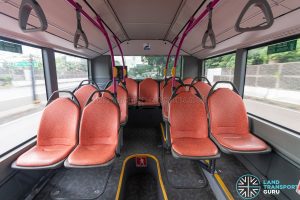
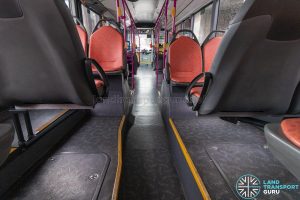
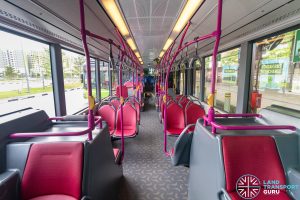
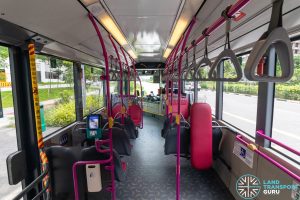
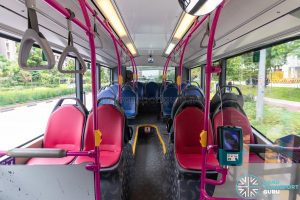
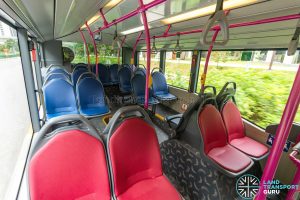
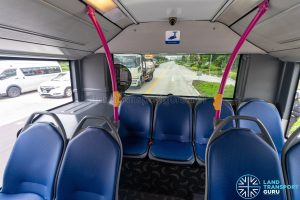
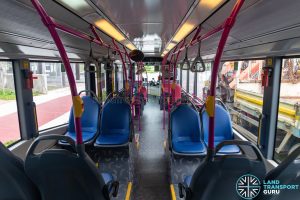
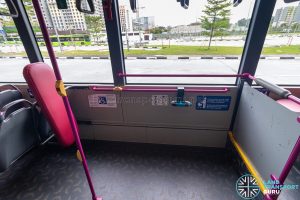
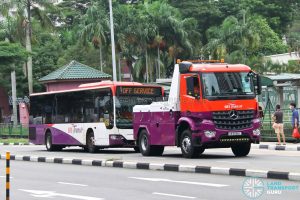
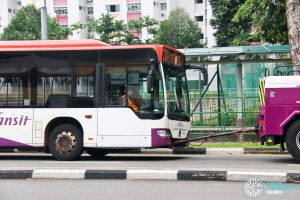
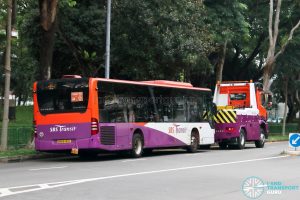
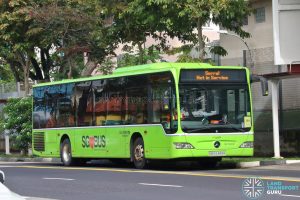
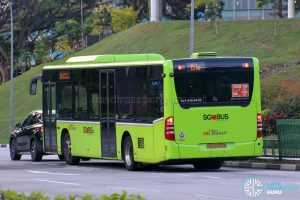
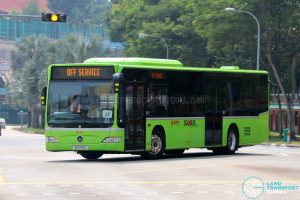
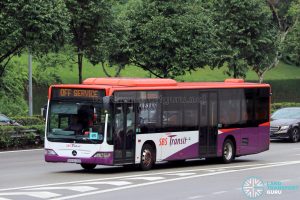
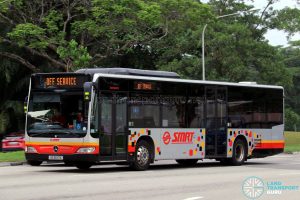
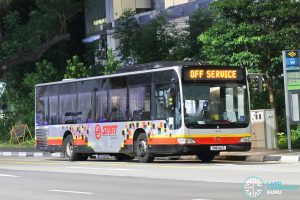
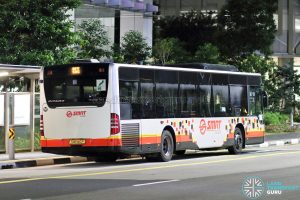
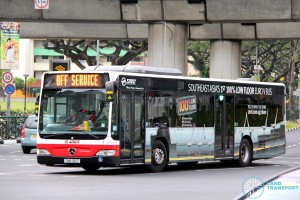
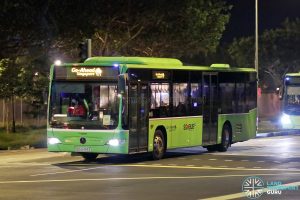
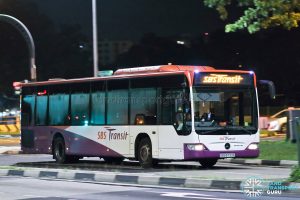
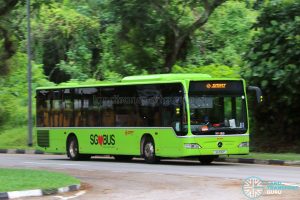
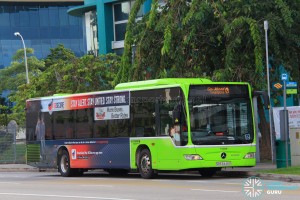
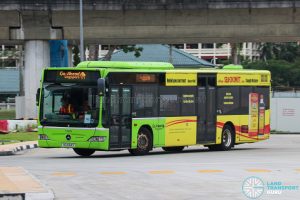
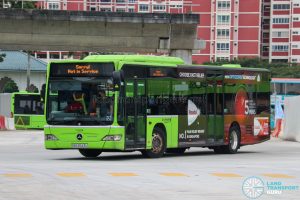
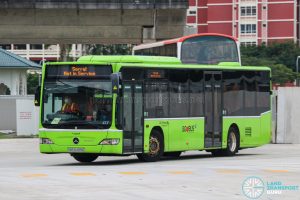
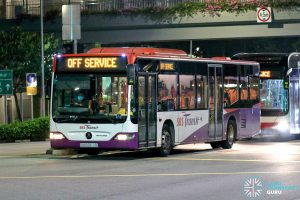
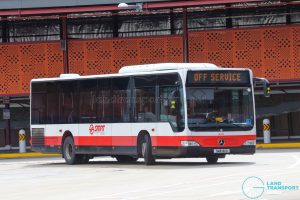
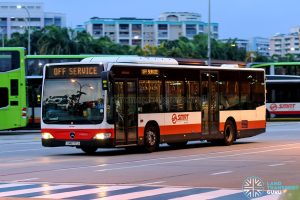
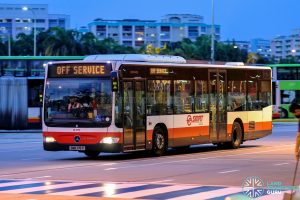
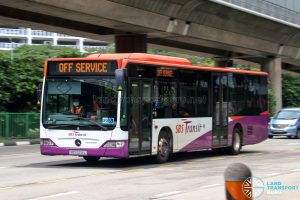
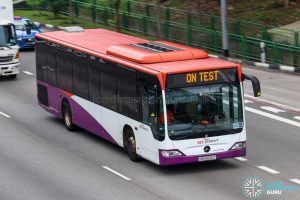
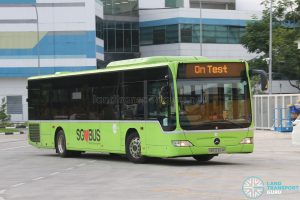
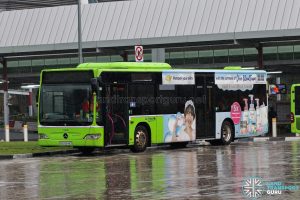
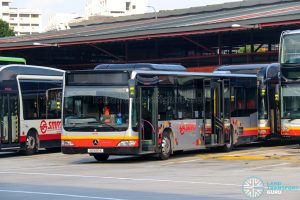
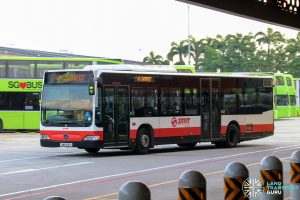
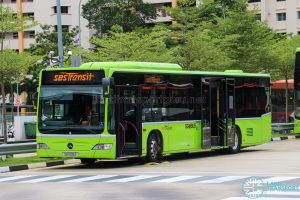
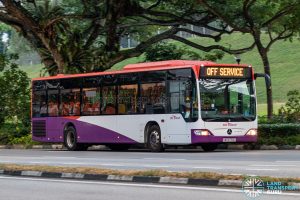
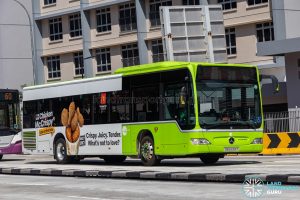
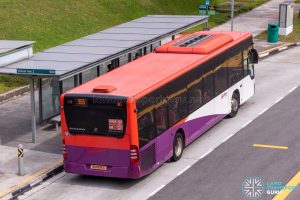
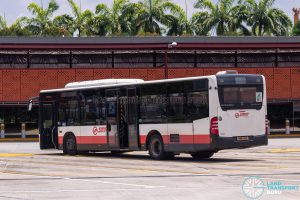
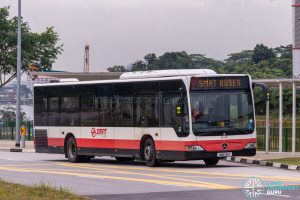
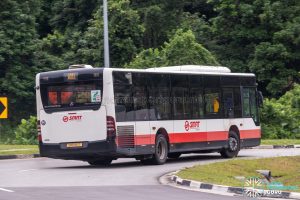
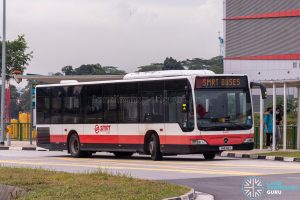
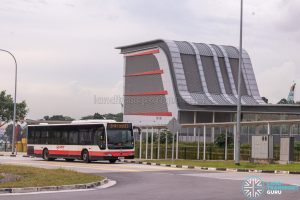
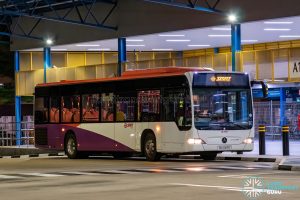
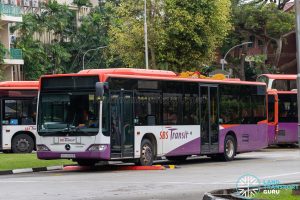
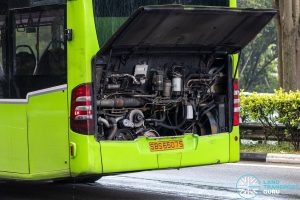
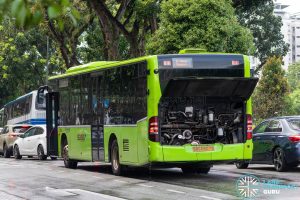
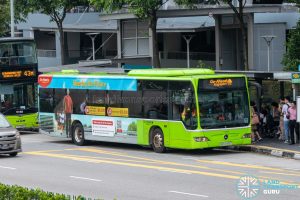
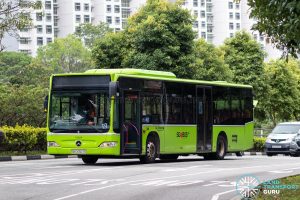
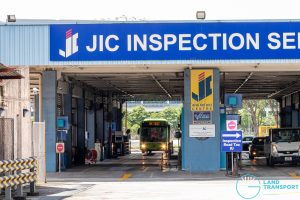
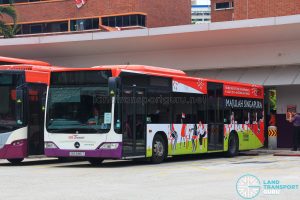
Difference between SMRT batches and others is keyless..
Reason for slow acceleration is the tiny 6.4L engine low boost turbo and the Voith gearbox.To make matter worse,LTA and PTO restrict the 1st gear to almost no power at all..For some buses even 2nd gear is sucks..LTA/SBST should opt for ZF transmission last time.Citaro tend to have powerloss during certain period of operation but again the bus is so easy to repair compared to MAN,OC or even Scania.
SBS6392E was caught in an accident which had its front badly damaged on 2 February 2020 at Changi Airport Terminal 2 whilst on Service 34. It is currently under non-user lay-up status till 30 April 2021.
Its back on the road already
Definitely the worst bus in SG currently. Poor initial acceleration, gear 2 boost like weird CCL acceleration makes the ride so jerky. The seats are rock solid hard, even event plastic chairs at CC events are more comfortable than that seat. The interior walls are made of easily dirtied cheap hollow plastic covers. And they also breakdown very often for some reason.
If you think Citaro is worse in SG, SBS Transit will have not purchased such large bulk orders it in the first place. But however, Citaro in Singapore still isn’t bad btw……. If you ride on Tower Transit 974 or any bus services along Expressway, the bus is quite fast and enjoyable. Think about it.
And for breakdown rate, I cannot explain but from what I can say, Citaro buses are running very good still.
Agreed. There is a very good reason why Citaros are an extremely popular choice not just in Singapore, but around the world. For a 6.4L engine, 286hp isn’t bad at all. Other than that, the simple yet iconic design and auto-kneeling functions are features of this model that have to be applauded for. To all those who keep on complaining about this bus, think twice about your status as a ‘bus enthusiast’.
Being a bus enthusiast doesn’t mean I can’t have an opinion on this bus in Singapore, which for me is negative. The 286hp generated from the 6.4L engine is by boosting the turbo in order to increase the power, and with such heavy reliance on the turbo, which kicks in not as soon as the engine starts running, there will be bound to have poor acceleration problems. This is made worse with the turbo suppression by the operator. And as for citaro being a popular bus, the engine choice for Singapore is very different from what other countries are opting, with others opting for higher cc engines coupled with zf ecolife/ecomat gearboxes. If Singapore had opted for a citaro with better specifications, it will definitely be a more preferred bus as compared to what we have now.
O530 Citaros are now outdated. Why not LTA purchase latest-gen citaro C2s?
Cost saving…
They brought a hybrid version.
yea they did for trial for 272 and 93
sg4004b that i was able to catch it on 272 but not 93